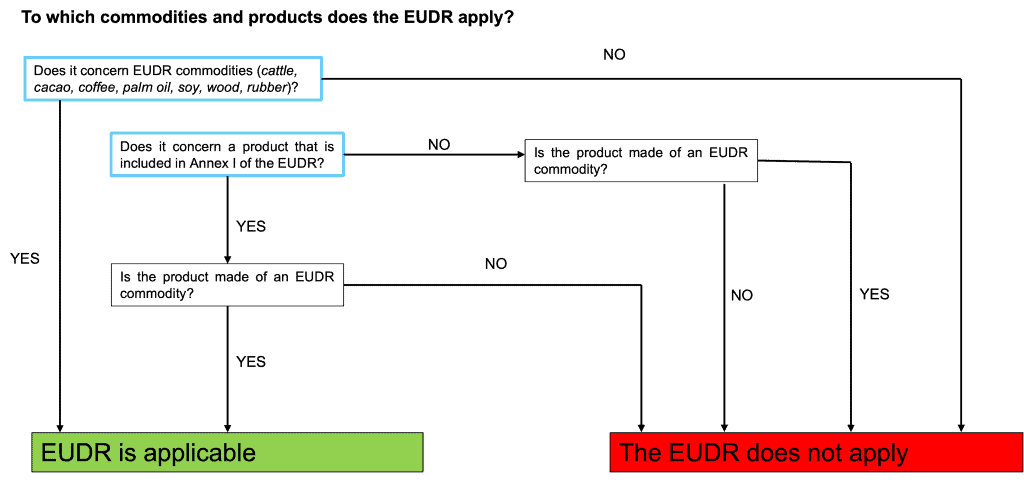As a company, you must meet an increasing number of compliance requirements. These include the anti-money laundering act, privacy legislation, trade sanctions against Russia, and more recently: the EUDR – the so-called Deforestation Regulation that applies in the European Union. What is the EUDR? When does the EUDR apply? And how can you ensure that you meet the obligations under the EUDR? We provide you with an overview.
Regulation on Deforestation-free Products (EUDR)
The ’Regulation on Deforestation-free Products (Reg. (EU) 2023/1115), or: the EUDR, concerns new European legislation that aims to combat climate change through deforestation. The EUDR stipulates that no commodities or products that cause deforestation or forest degradation may be placed on the market. Commodities or products that originate in certain areas that have been deforested after 30 December 2020 (the so-called ‘cut-off date’) may not be placed on the EU market or exported. Further, products must have been produced legally.
The EUDR is the successor to the European Timber Regulation (Reg. (EU) 995/2010), which applied to the import of timber and products deriving therefrom since 2013. The new EUDR has a broader scope (i.e. the regulation applies to more commodities and products) and entered into force on 29 June 2023. The obligations set out in the EUDR will be directly applicable in all Member States of the European Union as of 30 December 2024. This means that, as an entrepreneur, you need to comply with the obligations stemming from the EUDR by the end of this year.
What kind of goods and products does the EUDR apply to?
The EUDR applies to the following commodities:
- Cattle;
- Cocoa;
- Coffee;
- Palm oil;
- Soya;
- Rubber.
Furthermore, the EUDR applies to specific products derived from these commodities (as listed in Annex I of the EUDR), such as leather, chocolate, furniture, paper, steak or charcoal. In practice, it may not always be clear when exactly the EUDR applies. For example, ‘rubber’ is one of the commodities listed in the EUDR, but the Regulation only applies to natural rubber and products derived therefrom that are listed in Annex I. The EUDR does not apply to synthetic rubber.
On the other hand, for example ‘chairs’ are included in Annex I as a product to which the EUDR applies, but the EUDR will in fact only apply if the chair is made of wood. Products that are not included in Annex I, but do contain one of the above-mentioned commodities, are not subject to the EUDR. For example, hand soap often contains palm oil, but this product is not subject to the EUDR because it is not included in Annex I. This may lead to some confusion. We provide a graphic on the applicability of the EUDR to specific commodities and products below:

The European Commission intends to regularly update the list of commodities and products to which the EUDR applies, with the aim of preventing deforestation as much as possible.
A system of due diligence requirements
The end of the year will be here before you know it. It is therefore recommended to prepare yourself for the obligations arising from the EUDR. If you import or export goods to which the EUDR applies, you must be able to demonstrate the origin of these goods. A due diligence system must be set up for this purpose. In the Netherlands, the Netherlands Food and Consumer Product Safety Authority (NVWA) is the designated authority that monitors compliance with the EUDR. According to the NVWA, a due diligence system must at least comprise of the following:
- You must collect data on the (legal) origin of products;
- You must collect data on the geolocation where the product was grown, produced, processed, born or fed;
- You must perform risk analyses, which allow you to assess whether products contribute to deforestation or forest degradation;
- You must take measures to make sure the risk of illegal products being traded is negligible.
The ‘collection of data’ may sound a bit vague and could therefore raise some questions. It means, among other things, that when you’re importing or exporting EUDR goods, you must be able to provide precise geographical information on the (agricultural) land where the raw materials of the goods in question were grown, by means of satellite images and GPS coordinates. Based on this information, customs will be able to perform a check by comparing the situation at the time of import or export of the goods with the situation as of 30 December 2020 (in order to determine whether the goods were obtained through deforestation after this ‘cut-off date’.)
From 30 December 2024 onwards – due diligence statements
From 30 December 2024 onwards, a due diligence statement must be uploaded to the European Information System (which is currently being developed) for each EUDR shipment. In this statement, you must declare that you meet the requirements under the EUDR. The statement must further include your company details and accurately provide the origin of the commodities or products. In addition, you must declare yourself that there is no, or a negligible, risk of deforestation.
To which parties does the EUDR apply?
The EUDR distinguishes between ‘non-SME traders’ (or: ‘large’ traders) and SME traders (small and medium-sized companies). A trading company qualifies as ‘large’ if it either has more than 250 FTEs or an annual turnover of more than EUR 50 million, and a balance sheet total of more than EUR 43 million. The full due diligence and information requirements of the EUDR apply to large companies. As an SME trader, you are not required to implement your own due diligence system. However, if the imported or exported goods fall under the scope of the EUDR, an SME trader must keep records of which supplier the commodities or products were purchased from, to whom they are resold (unless they are sold to private individuals), provide the reference numbers of the due diligence statements of their own suppliers and keep this information for five years.
For (SME) companies further down the supply chain, to submit a due diligence statement, it often suffices to provide relevant reference numbers, referring to due diligence previously/already performed by companies higher in the supply chain. However, these companies in such cases are not released from the obligations and liability arising from the EUDR in the event of a violation of one of the EUDR provisions. In case there are any doubts or concerns, it is therefore advisable to request additional information from your supplier to ensure that the due diligence requirements under the EUDR have indeed been met.
To assess whether, and if so, which obligations under the EUDR apply to you, you can use the tool created by the NVWA.
You must comply with the EUDR from 30 December 2024. However, the European Commission wants to delay the introduction of the EUDR by one year. This proposal still needs to be approved by the European Parliament and EU Member States.
More information
Do you have any questions or are you looking for a lawyer specialized in Deforestation Regulation (EUDR)? Please contact one of our colleagues of Trade, Industry and Logistics.




